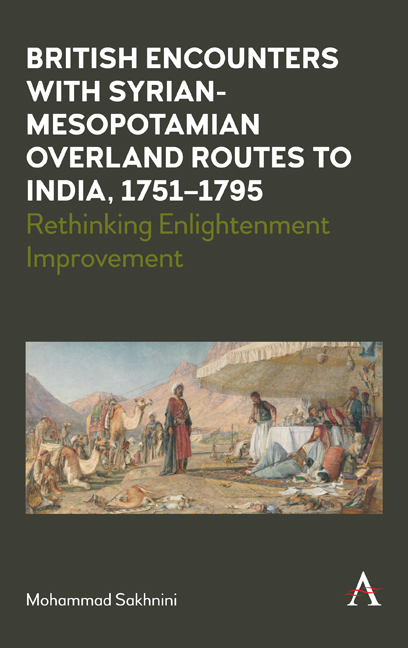 British Encounters with Syrian-Mesopotamian Overland Routes to India, 1751-1795
British Encounters with Syrian-Mesopotamian Overland Routes to India, 1751-1795 Book contents
- Frontmatter
- Contents
- Acknowledgment
- Introduction: Pluralising The Enlightenment: Improvement And Cross-Cultural Encounters
- Chapter One Improvement of Knowledge: John Carmichael’s A Journey From Aleppo to Busserah, Over the Desert (1772)
- Chapter Two Polite Englishman in the East: Edward Ives’s Journey from Persia to England (1773)
- Chapter Three Commerce, Virtue and Improvement: Abraham Parsons’s Travel in Asia and Africa (1808)
- Chapter Four Henry Abbott: A Cosmopolitan in Cities and Deserts
- Chapter Five Eyles Irwin’s Travels: The Politics of Adventure in the Levant
- Chapter Six Political and Moral Improvement: Donald Campbell, A Journey Overland to India Partly by A Route Never Gone Before by Any European (1795)
- Conclusion
- Unpublished Manuscripts
- Reference List
- Index
Introduction: Pluralising The Enlightenment: Improvement And Cross-Cultural Encounters
Published online by Cambridge University Press: 15 November 2023
- Frontmatter
- Contents
- Acknowledgment
- Introduction: Pluralising The Enlightenment: Improvement And Cross-Cultural Encounters
- Chapter One Improvement of Knowledge: John Carmichael’s A Journey From Aleppo to Busserah, Over the Desert (1772)
- Chapter Two Polite Englishman in the East: Edward Ives’s Journey from Persia to England (1773)
- Chapter Three Commerce, Virtue and Improvement: Abraham Parsons’s Travel in Asia and Africa (1808)
- Chapter Four Henry Abbott: A Cosmopolitan in Cities and Deserts
- Chapter Five Eyles Irwin’s Travels: The Politics of Adventure in the Levant
- Chapter Six Political and Moral Improvement: Donald Campbell, A Journey Overland to India Partly by A Route Never Gone Before by Any European (1795)
- Conclusion
- Unpublished Manuscripts
- Reference List
- Index
Summary
Knowledge emerged from a practice.
—Henry Lefebvre, The Production of Space (1974)In the Desert, as at sea, there is fellowship in every living thing.
—Thomas Skinner, Adventures during a Journey Overland to India(1863)In the past 40 years, many scholars have debated the extent to which European literary, cultural and scientific traditions have been shaped by a rich history of encounter between Europe and the Ottoman-Arab region. In most of these studies, two methodological paradigms framed almost all scholarly engagements with the politics of encounter. The first paradigm I wish to call ‘the hegemony paradigm’. This paradigm is shaped by a postcolonial reading of European literary and philosophical heritage of the past three hundred years. Informed by Edward Said’s Orientalism, which was first published in 1978, the scholarship in this paradigm has shown how many nineteenth- and twentieth-century European representations of the Orient shaped and were shaped by a systemic discourse of power and knowledge, what Said called ‘the enormously systematic discipline by which European culture was able to manage-and even produce-the Orient politically, sociologically, militarily, ideologically, scientifically, and imaginatively during the post-Enlightenment period’ (Said 2003: 3). The second one I wish to call ‘the displacement paradigm’. Informed by eminent anthropological and sociological works, such as those by Claude Lévi-Strauss (1955) and Clifford James Geertz (1997), studies in this paradigm showed how the act of ‘speaking’ about different cultures constitutes opportunities for negotiating and rethinking dominant debates in one’s own culture. Both paradigms differ on the question of agency, that is, the author, according to the first paradigm, speaks for the Other, whereas he or she, according to the second paradigm, uses the Other in an effort to speak to and on behalf of one’s own culture. Despite the difference in the said approaches, both show how the Other embodies the values and manners which the Self wishes to negate about its own culture: despotism, religious excesses, misogyny and intol-erant attitudes towards minorities. Despite their difference, both paradigms capture the moral tensions involving living in a world teeming with diverse cultural and value systems.
Scholars such as Billie Melman (1992 , 2002), Gerald MacLean (2004), Geoffrey Nash (2005) and recently Katrina O’Loughlin (2018), among others, have complicated these paradigms by demonstrating how European writings about the Ottoman-Arab East revealed complex and diverse cross-cultural attitudes, showing how complex notions of class, gender and nation shaped and were shaped by encounters.
- Type
- Chapter
- Information
- British Encounters with Syrian-Mesopotamian Overland Routes to India, 1751-1795Rethinking Enlightenment Improvement, pp. 1 - 30Publisher: Anthem PressPrint publication year: 2023
